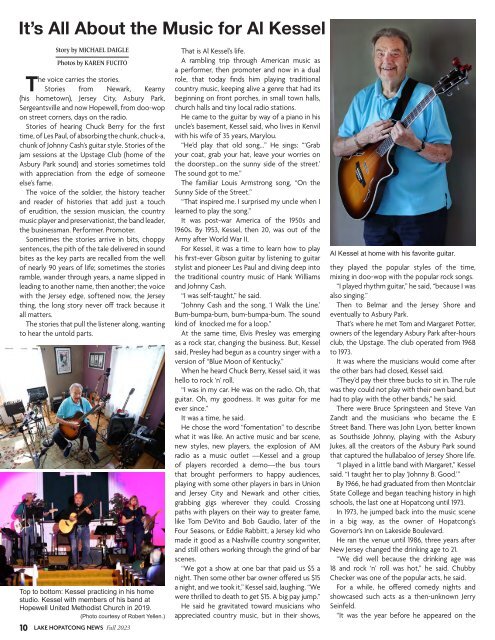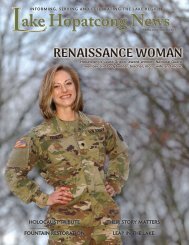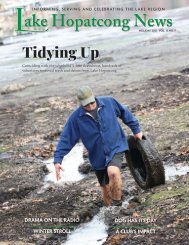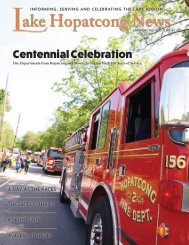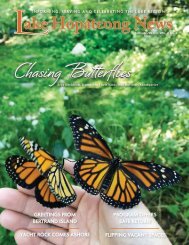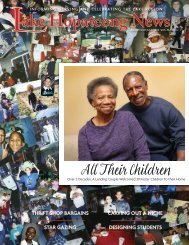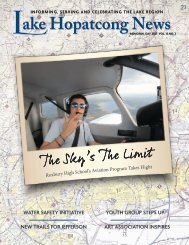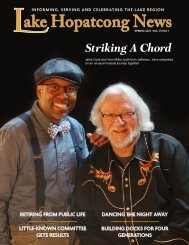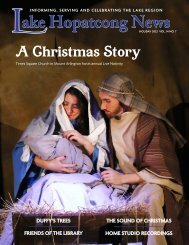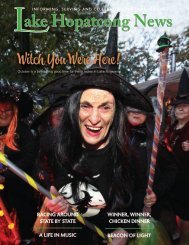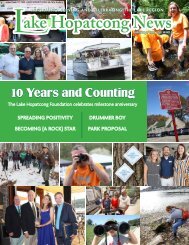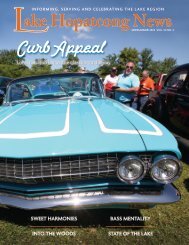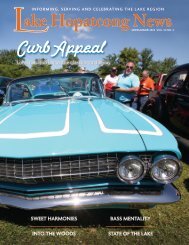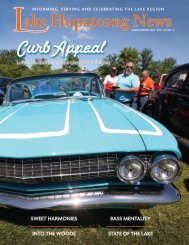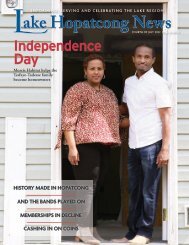2023 Fall Issue
You also want an ePaper? Increase the reach of your titles
YUMPU automatically turns print PDFs into web optimized ePapers that Google loves.
It’s All About the Music for Al Kessel<br />
10<br />
Story by MICHAEL DAIGLE<br />
Photos by KAREN FUCITO<br />
The voice carries the stories.<br />
Stories from Newark, Kearny<br />
(his hometown), Jersey City, Asbury Park,<br />
Sergeantsville and now Hopewell, from doo-wop<br />
on street corners, days on the radio.<br />
Stories of hearing Chuck Berry for the first<br />
time, of Les Paul, of absorbing the chunk, chuck-a,<br />
chunk of Johnny Cash’s guitar style. Stories of the<br />
jam sessions at the Upstage Club (home of the<br />
Asbury Park sound) and stories sometimes told<br />
with appreciation from the edge of someone<br />
else’s fame.<br />
The voice of the soldier, the history teacher<br />
and reader of histories that add just a touch<br />
of erudition, the session musician, the country<br />
music player and preservationist, the band leader,<br />
the businessman. Performer. Promoter.<br />
Sometimes the stories arrive in bits, choppy<br />
sentences, the pith of the tale delivered in sound<br />
bites as the key parts are recalled from the well<br />
of nearly 90 years of life; sometimes the stories<br />
ramble, wander through years, a name slipped in<br />
leading to another name, then another; the voice<br />
with the Jersey edge, softened now, the Jersey<br />
thing, the long story never off track because it<br />
all matters.<br />
The stories that pull the listener along, wanting<br />
to hear the untold parts.<br />
Top to bottom: Kessel practicing in his home<br />
studio. Kessel with members of his band at<br />
Hopewell United Methodist Church in 2019.<br />
(Photo courtesy of Robert Yellen.)<br />
LAKE HOPATCONG NEWS <strong>Fall</strong> <strong>2023</strong><br />
That is Al Kessel’s life.<br />
A rambling trip through American music as<br />
a performer, then promoter and now in a dual<br />
role, that today finds him playing traditional<br />
country music, keeping alive a genre that had its<br />
beginning on front porches, in small town halls,<br />
church halls and tiny local radio stations.<br />
He came to the guitar by way of a piano in his<br />
uncle’s basement, Kessel said, who lives in Kenvil<br />
with his wife of 35 years, Marylou.<br />
“He’d play that old song…” He sings: “‘Grab<br />
your coat, grab your hat, leave your worries on<br />
the doorstep…on the sunny side of the street.’<br />
The sound got to me.”<br />
The familiar Louis Armstrong song, “On the<br />
Sunny Side of the Street.”<br />
“That inspired me. I surprised my uncle when I<br />
learned to play the song.”<br />
It was post-war America of the 1950s and<br />
1960s. By 1953, Kessel, then 20, was out of the<br />
Army after World War II.<br />
For Kessel, it was a time to learn how to play<br />
his first-ever Gibson guitar by listening to guitar<br />
stylist and pioneer Les Paul and diving deep into<br />
the traditional country music of Hank Williams<br />
and Johnny Cash.<br />
“I was self-taught,” he said.<br />
“Johnny Cash and the song, ‘I Walk the Line.’<br />
Bum-bumpa-bum, bum-bumpa-bum. The sound<br />
kind of knocked me for a loop.”<br />
At the same time, Elvis Presley was emerging<br />
as a rock star, changing the business. But, Kessel<br />
said, Presley had begun as a country singer with a<br />
version of “Blue Moon of Kentucky.”<br />
When he heard Chuck Berry, Kessel said, it was<br />
hello to rock ‘n’ roll.<br />
“I was in my car. He was on the radio. Oh, that<br />
guitar. Oh, my goodness. It was guitar for me<br />
ever since.”<br />
It was a time, he said.<br />
He chose the word “fomentation” to describe<br />
what it was like. An active music and bar scene,<br />
new styles, new players, the explosion of AM<br />
radio as a music outlet —Kessel and a group<br />
of players recorded a demo—the bus tours<br />
that brought performers to happy audiences,<br />
playing with some other players in bars in Union<br />
and Jersey City and Newark and other cities,<br />
grabbing gigs wherever they could. Crossing<br />
paths with players on their way to greater fame,<br />
like Tom DeVito and Bob Gaudio, later of the<br />
Four Seasons, or Eddie Rabbitt, a Jersey kid who<br />
made it good as a Nashville country songwriter,<br />
and still others working through the grind of bar<br />
scenes.<br />
“We got a show at one bar that paid us $5 a<br />
night. Then some other bar owner offered us $15<br />
a night, and we took it,” Kessel said, laughing. “We<br />
were thrilled to death to get $15. A big pay jump.”<br />
He said he gravitated toward musicians who<br />
appreciated country music, but in their shows,<br />
Al Kessel at home with his favorite guitar.<br />
they played the popular styles of the time,<br />
mixing in doo-wop with the popular rock songs.<br />
“I played rhythm guitar,” he said, “because I was<br />
also singing.”<br />
Then to Belmar and the Jersey Shore and<br />
eventually to Asbury Park.<br />
That’s where he met Tom and Margaret Potter,<br />
owners of the legendary Asbury Park after-hours<br />
club, the Upstage. The club operated from 1968<br />
to 1973.<br />
It was where the musicians would come after<br />
the other bars had closed, Kessel said.<br />
“They’d pay their three bucks to sit in. The rule<br />
was they could not play with their own band, but<br />
had to play with the other bands,” he said.<br />
There were Bruce Springsteen and Steve Van<br />
Zandt and the musicians who became the E<br />
Street Band. There was John Lyon, better known<br />
as Southside Johnny, playing with the Asbury<br />
Jukes, all the creators of the Asbury Park sound<br />
that captured the hullabaloo of Jersey Shore life.<br />
“I played in a little band with Margaret,” Kessel<br />
said. “I taught her to play ‘Johnny B. Good.’”<br />
By 1966, he had graduated from then Montclair<br />
State College and began teaching history in high<br />
schools, the last one at Hopatcong until 1973.<br />
In 1973, he jumped back into the music scene<br />
in a big way, as the owner of Hopatcong’s<br />
Governor’s Inn on Lakeside Boulevard.<br />
He ran the venue until 1986, three years after<br />
New Jersey changed the drinking age to 21.<br />
“We did well because the drinking age was<br />
18 and rock ‘n’ roll was hot,” he said. Chubby<br />
Checker was one of the popular acts, he said.<br />
For a while, he offered comedy nights and<br />
showcased such acts as a then-unknown Jerry<br />
Seinfeld.<br />
“It was the year before he appeared on the


